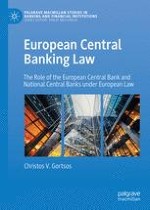2020 | OriginalPaper | Buchkapitel
6. Institutional Aspects of the European Central Bank
verfasst von : Christos V. Gortsos
Erschienen in: European Central Banking Law
Verlag: Springer International Publishing
Aktivieren Sie unsere intelligente Suche, um passende Fachinhalte oder Patente zu finden.
Wählen Sie Textabschnitte aus um mit Künstlicher Intelligenz passenden Patente zu finden. powered by
Markieren Sie Textabschnitte, um KI-gestützt weitere passende Inhalte zu finden. powered by
